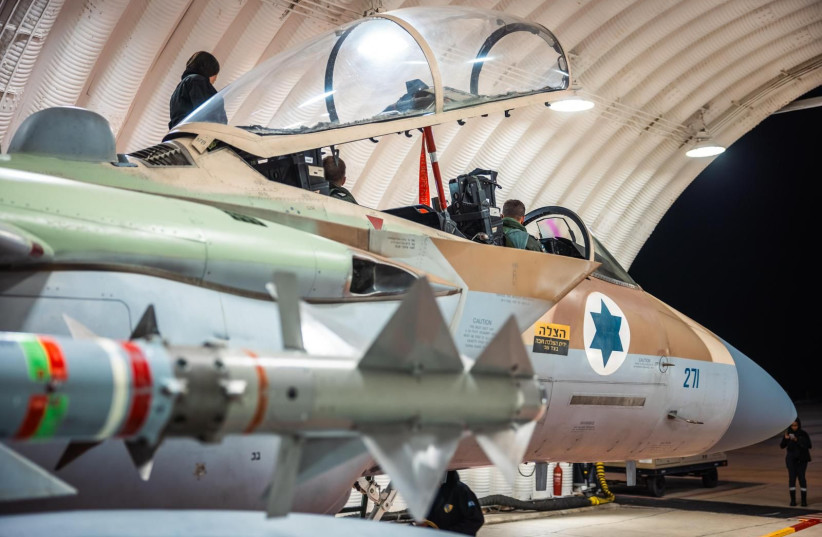Iran’s unprecedented attack on Israel on Saturday night into early Sunday morning should be perceived as a declaration of war. This is the first instance since 1991 that a foreign country has directly attacked Israel. Notably, this attack was executed on a large scale, reminiscent of the intensity seen during the Yom Kippur War. Israel has faced and effectively countered a diverse and extensive assault, including hundreds of UAVs, ballistic missiles and cruise missiles in one unified attack – a unique challenge in its history.
The Iranian attack signifies a concerning shift in the Islamic Republic’s security policy and perception. Since the 1979 Islamic revolution, Iran has maintained a cautious approach, adhering to clear rules and redlines with the United States and Israel due to the significant security disparity between the parties. Iran’s strategy involved establishing, arming, training and financing proxies across the Middle East to encircle Israel, serving as a deterrent against potential attacks on its military nuclear program by Jerusalem or Washington.
In recent years, Iran has displayed increasing boldness, escalating its actions to new levels. This was evident in direct Iranian attacks on Saudi Arabia’s oil installations (although Iran did not claim responsibility for the attack) and in response to the assassination of Qassem Soleimani, commander of the Quds Force of the Revolutionary Guards. Following Soleimani’s killing, Tehran launched a direct attack on the American Air Force base in Ain al-Assad, Iraq, marking the first time Iran directly targeted American assets, albeit on Iraqi soil. Now, Iran has taken another significant step by directly attacking Israeli targets and the State of Israel itself, and also by taking responsibility for the attack.
Despite Iran’s unprecedented and extensive attack, it can be considered a significant failure. Israel achieved a remarkable feat in operational defense on a historic scale. According to the IDF, 99% of Iran’s launches were intercepted before entering Israel’s airspace, with only minor damage reported at the Nabatim base, which remains operational.
How should Israel respond to Iran's attack?
ISRAEL’S DEFENSIVE success is not just about the high number of interceptions but also the diversity of attack methods, including UAVs and cruise and ballistic missiles, originating from multiple arenas and angles simultaneously (Iran, Iraq, and Yemen). This was compounded by rocket launches from Lebanon by Hezbollah, although this did not represent an escalation beyond previous actions since October 7.

Another notable accomplishment for Israel involves international and regional collaboration. The regional defense coalition, overseen by the United States Central Command (CENTCOM) and established through the “Abraham” agreements, demonstrated remarkable precision and effectiveness. This collaboration featured the utilization of radar systems and interceptor launchers from the United States, Great Britain, France, Jordan, and other regional partners. Thanks to this international and regional cooperation, all UAVs, cruise missiles, and the majority of ballistic missiles were intercepted en route to the Jewish state.
On the diplomatic front, Israel has bolstered its international legitimacy in combating global terrorism. It has also garnered support for directly targeting Iran, even in instances where the United States is not directly involved in the military action.
THE IRANIAN attack represents a challenge to Israel’s longstanding deterrence strategy, which has been effectively employed in recent decades. Israel cannot afford to ignore this direct Iranian attack on its territory, a first in its history. It must seize this opportunity to launch a comprehensive counterattack against Iran, aiming to restore its deterrence and demonstrate strength and resolve to the world and the region. Failing to respond would signal a strategic blow to Israel and could embolden future Iranian aggression, even in response to covert Israeli actions, portraying Israel as vulnerable.
It is possible to try to reduce the American fear of a regional war through close coordination with Washington regarding the Israeli attack targets in Iran, which will be acceptable to both the Biden administration and Israel.
For Israeli deterrence to endure for decades to come, Iran must face the full extent of Israel’s military and security capabilities. An Israeli counterattack should target key elements of Iran’s military nuclear program, ballistic missile program, and UAV and cruise missile production, as well as its weapons industry. This strike should not only focus on Iran but also include targets in Yemen belonging to the Houthis and Shi’ite militias in Iraq, from where attacks against Israel have originated.
Israel’s neighbors and adversaries are closely observing its actions. Such a decisive strike would send a clear, powerful, and deterring message to Iran and the entire region, especially following Hamas’s October 7 attack. It would demonstrate that any aggression against Israel would be a grave mistake with severe consequences.
The writer is a military strategy and national security expert, and a researcher at the Jerusalem Institute for Strategy and Security (JISS) and the Israel Defense and Security Forum-Habithonistim.
